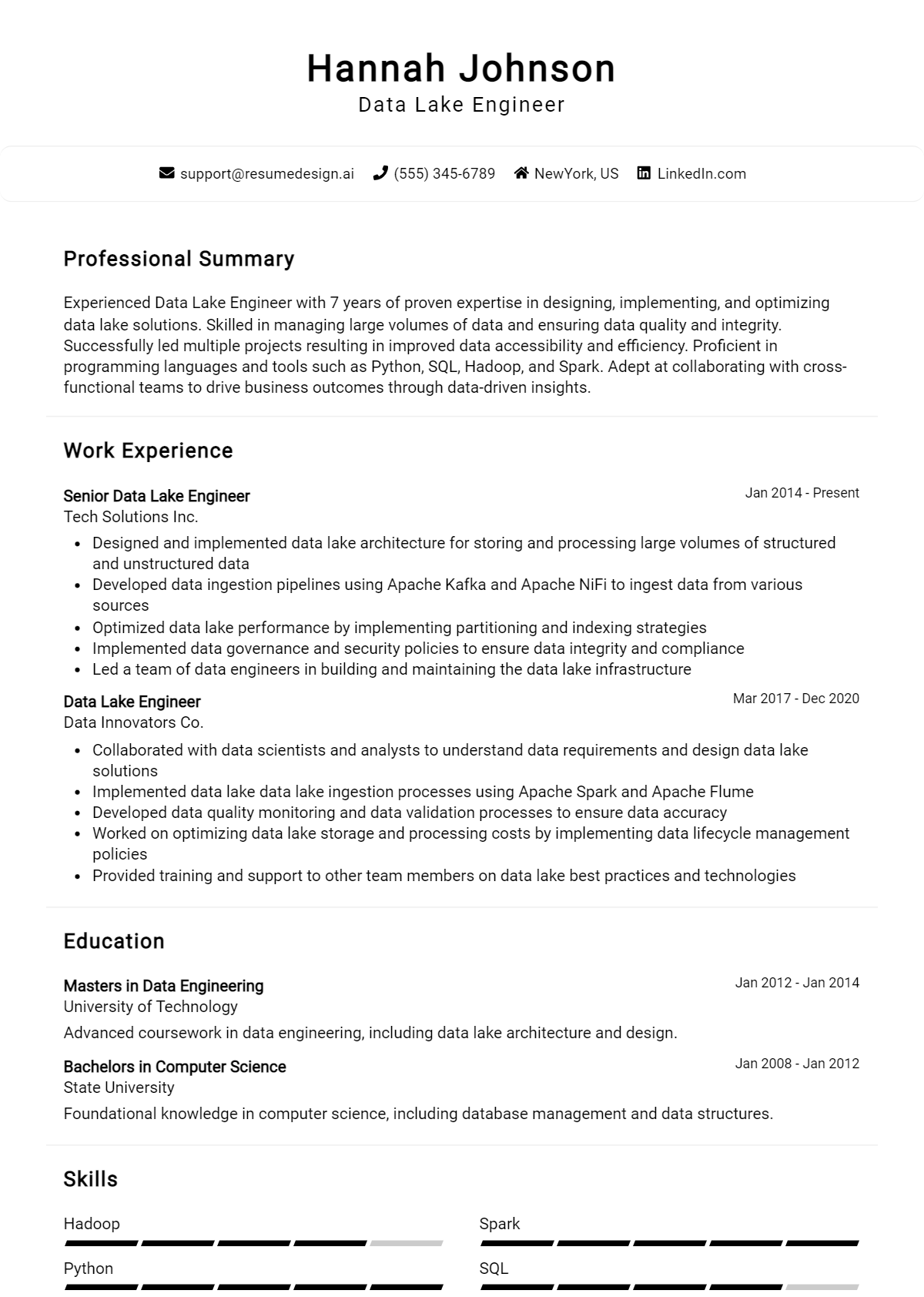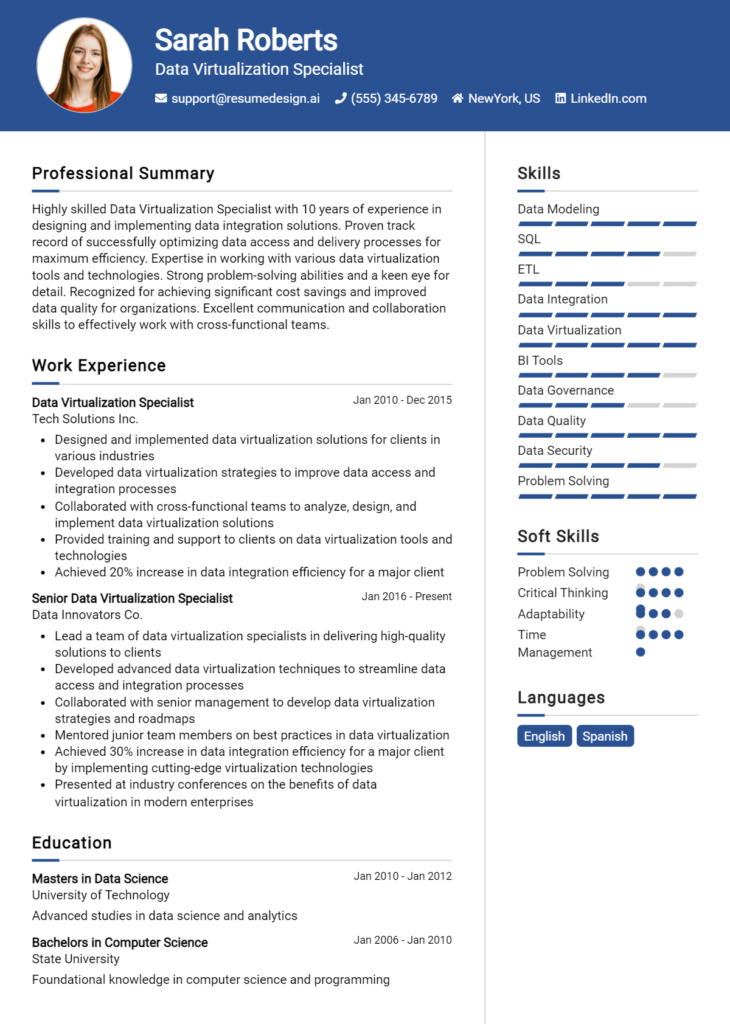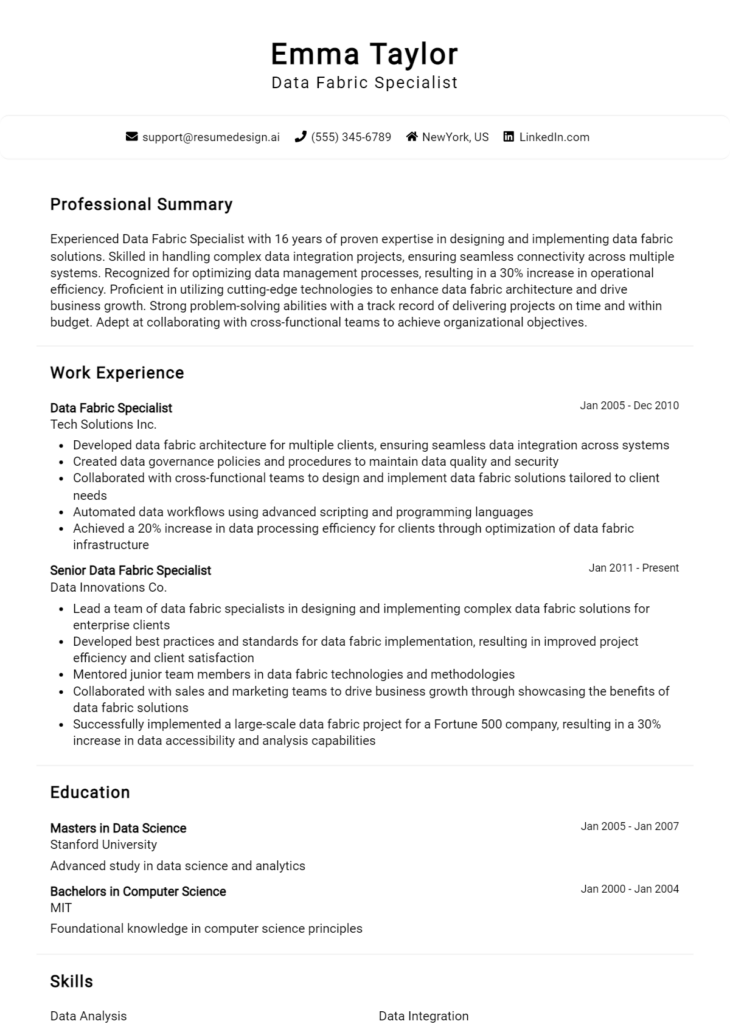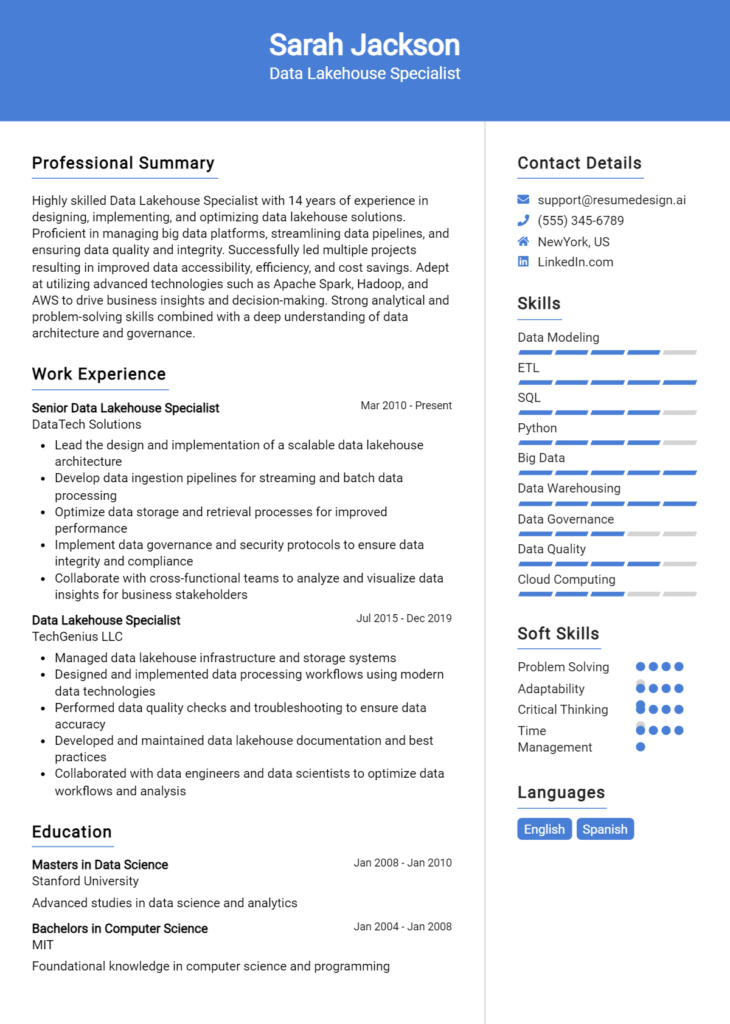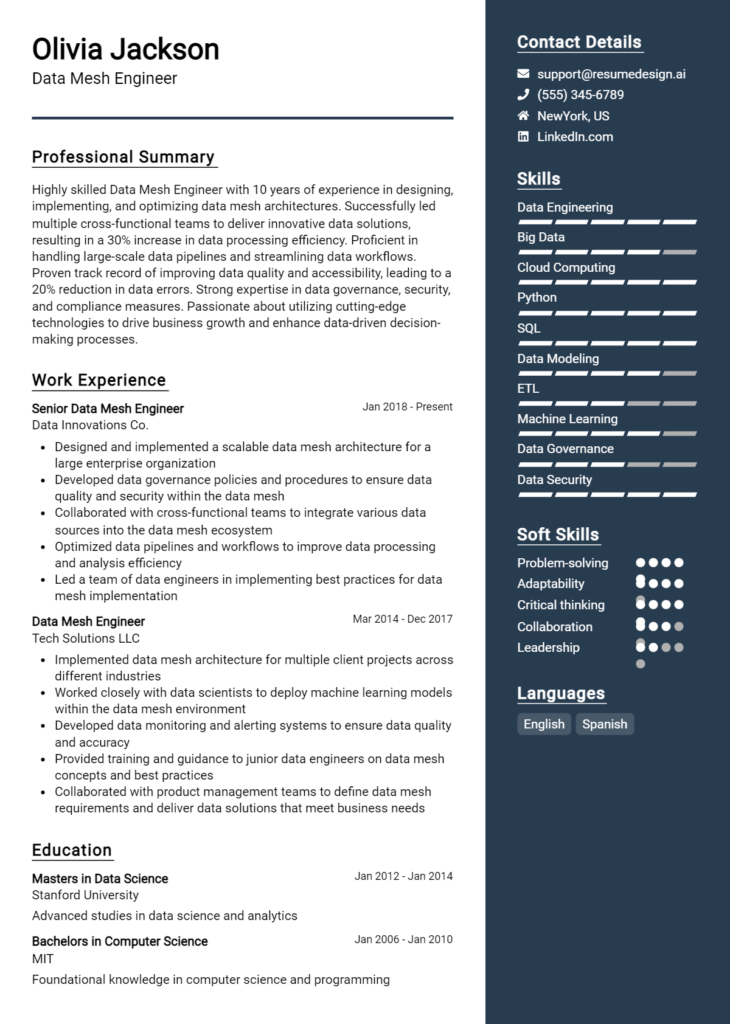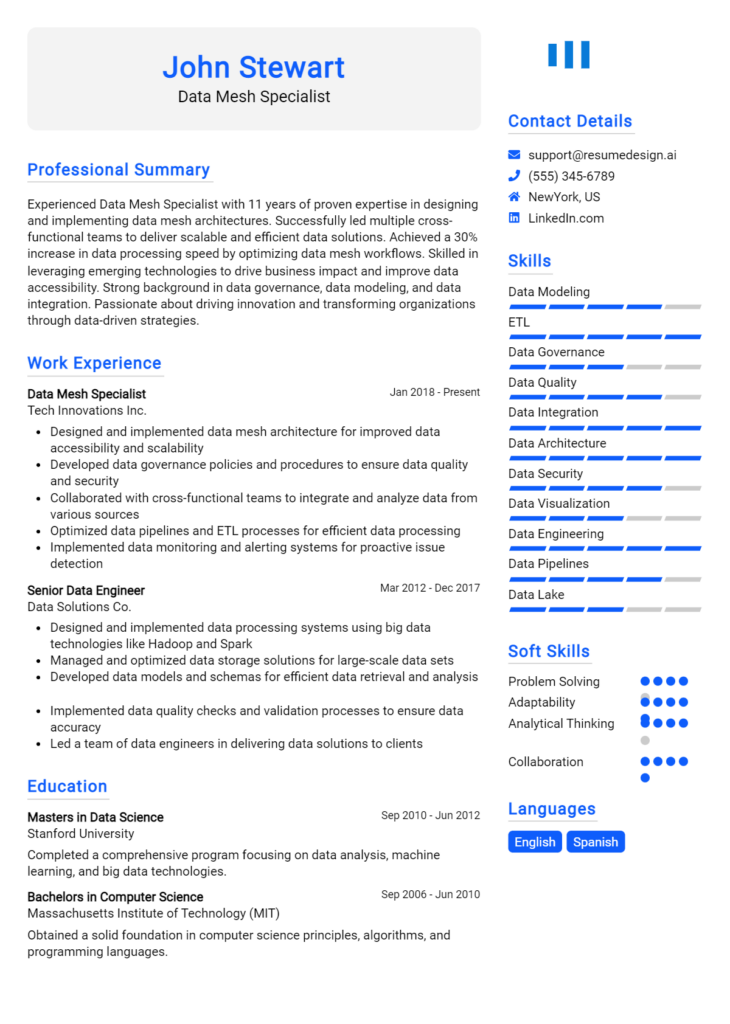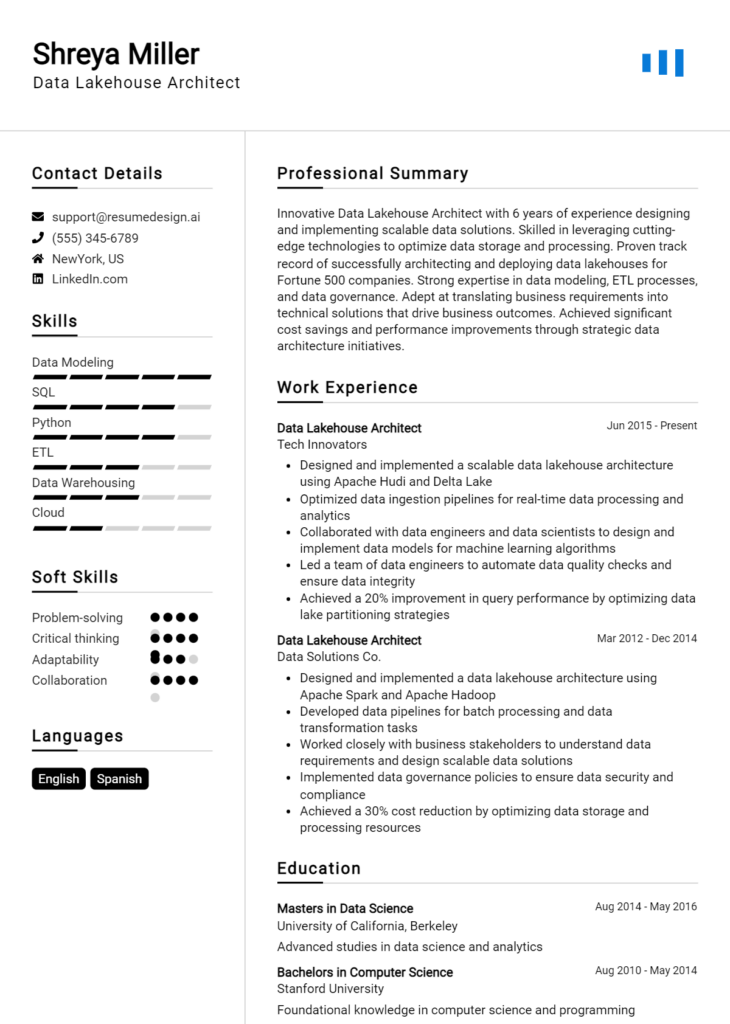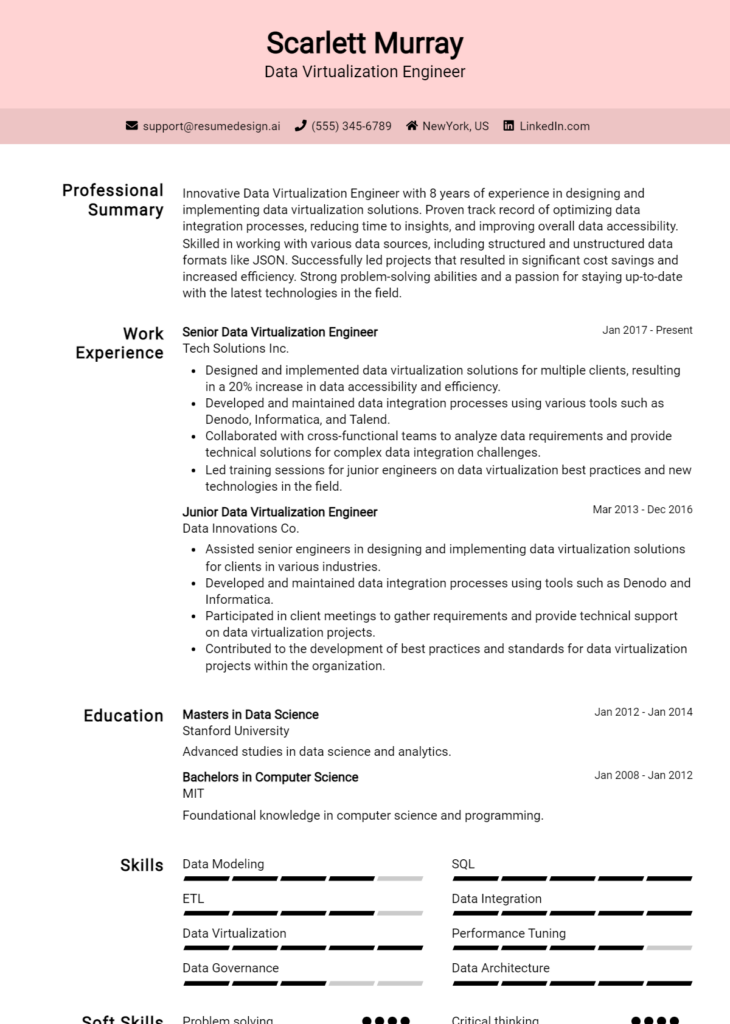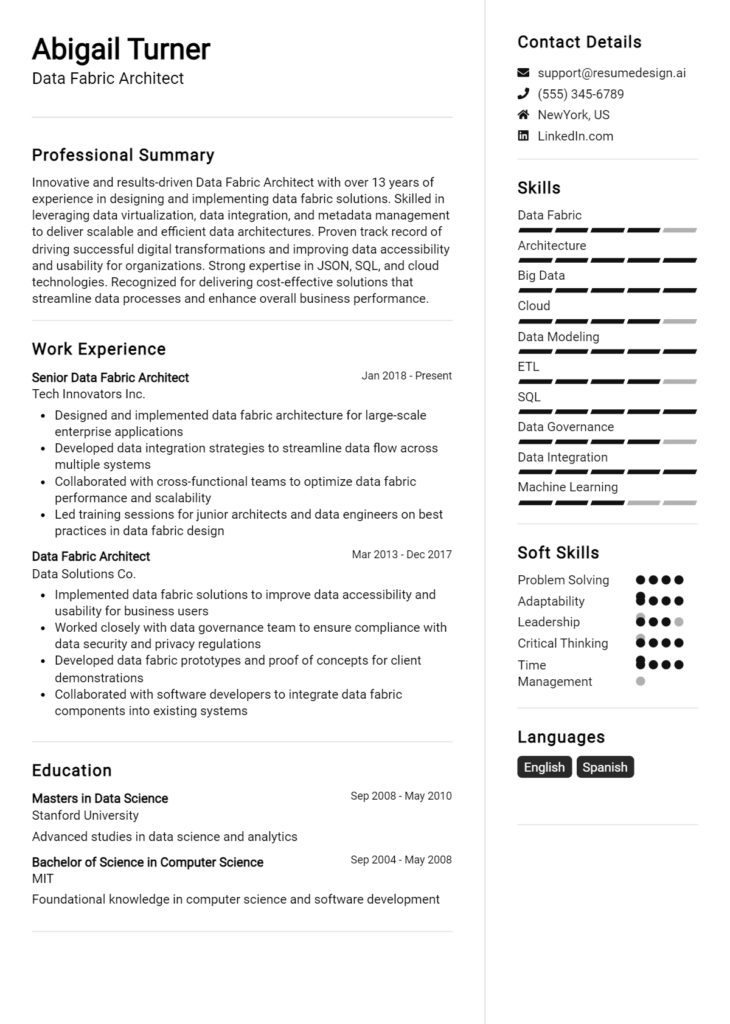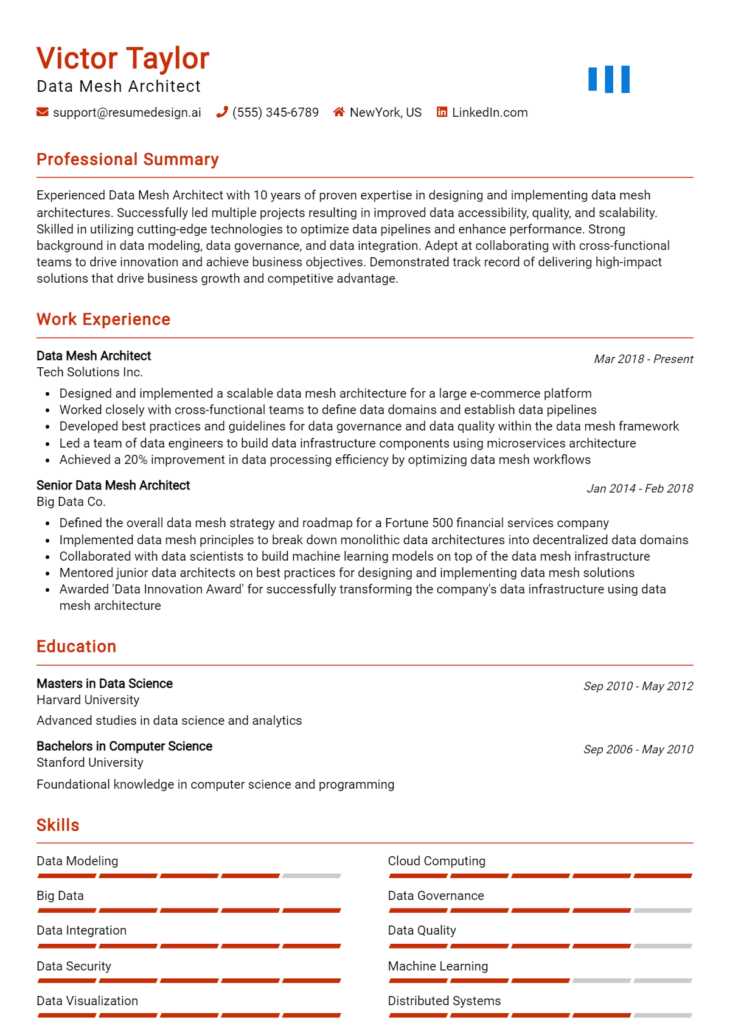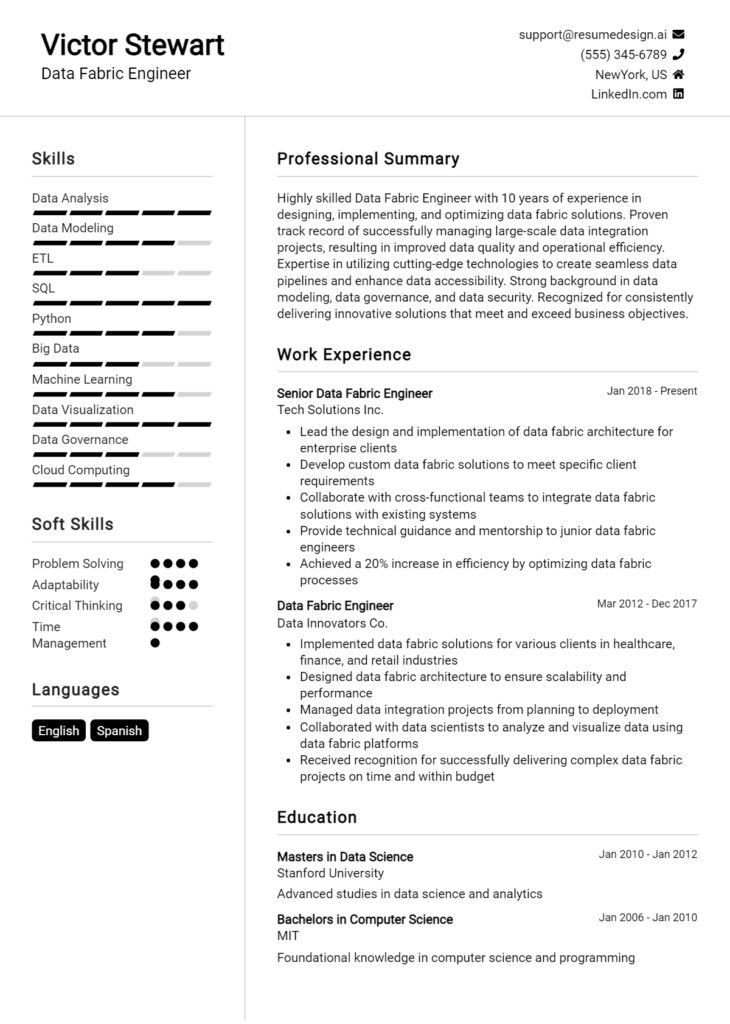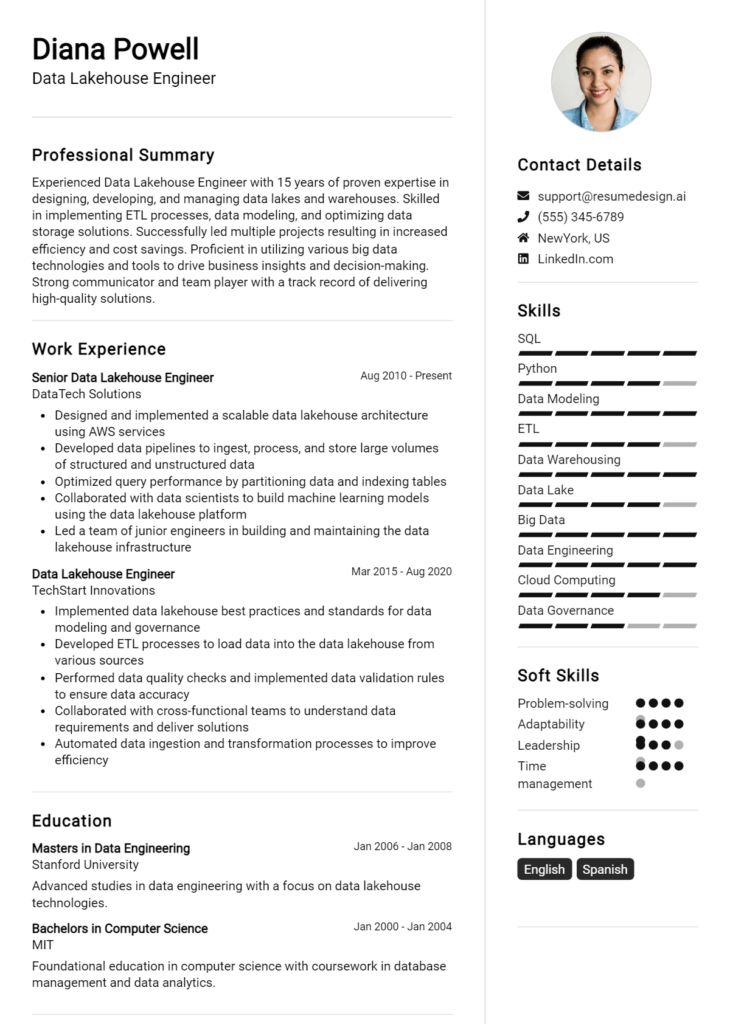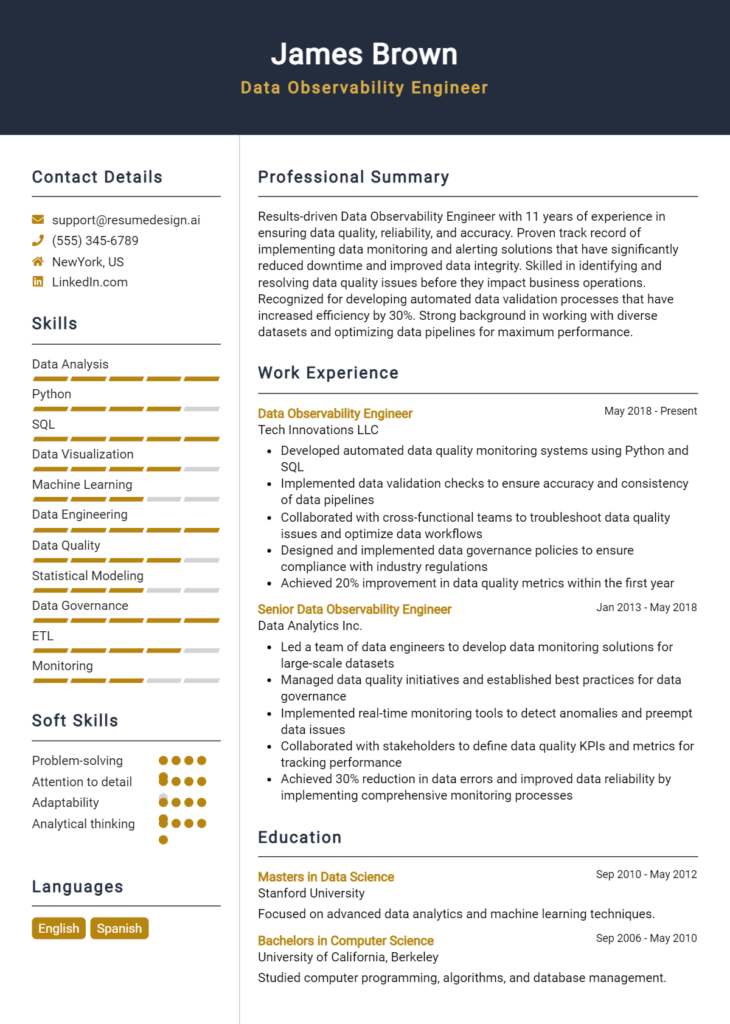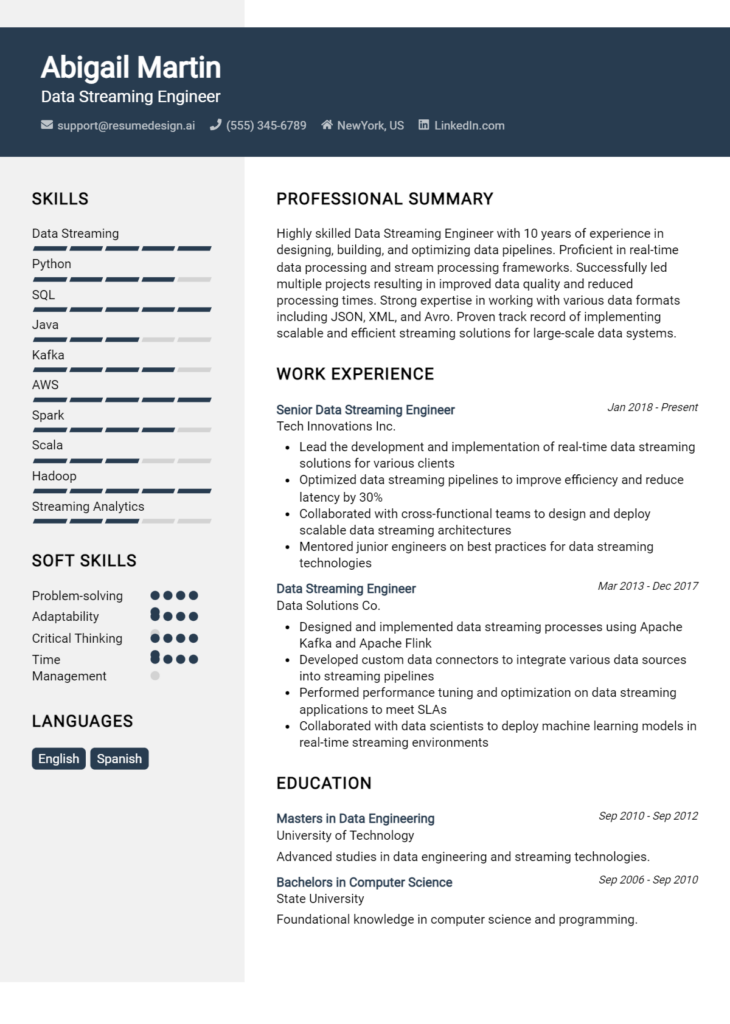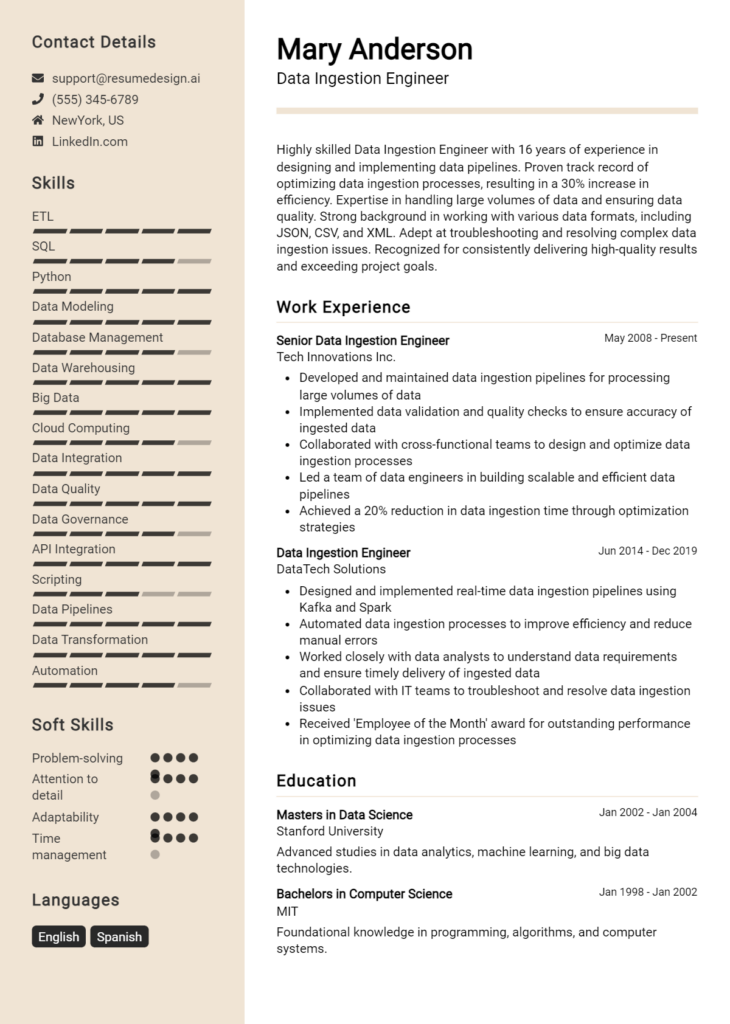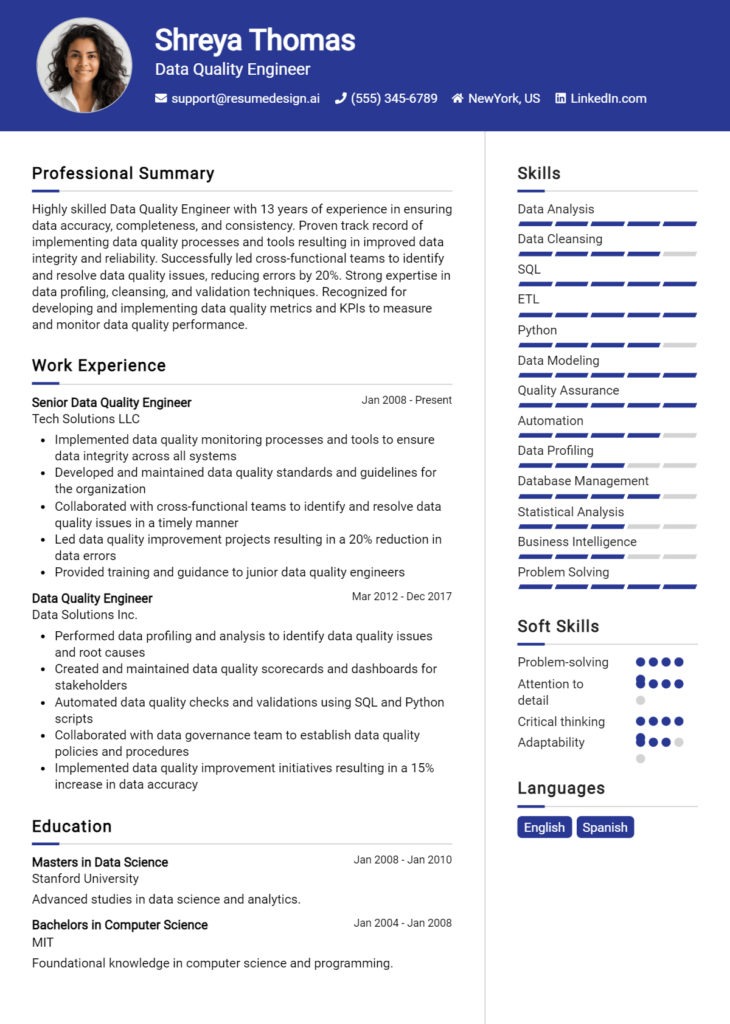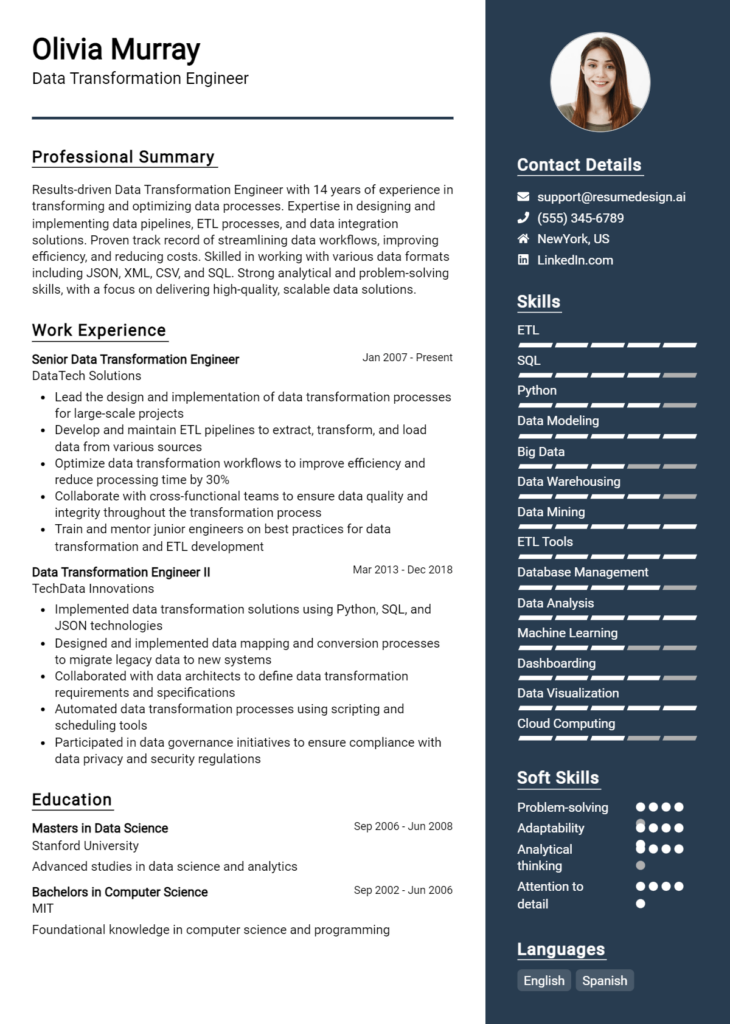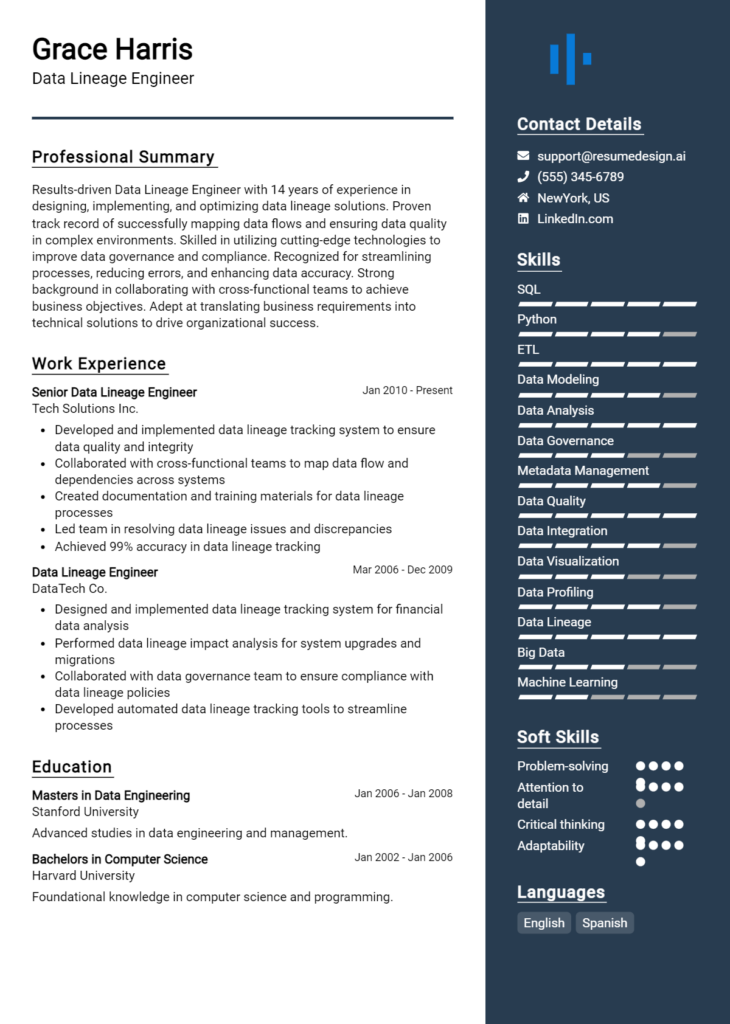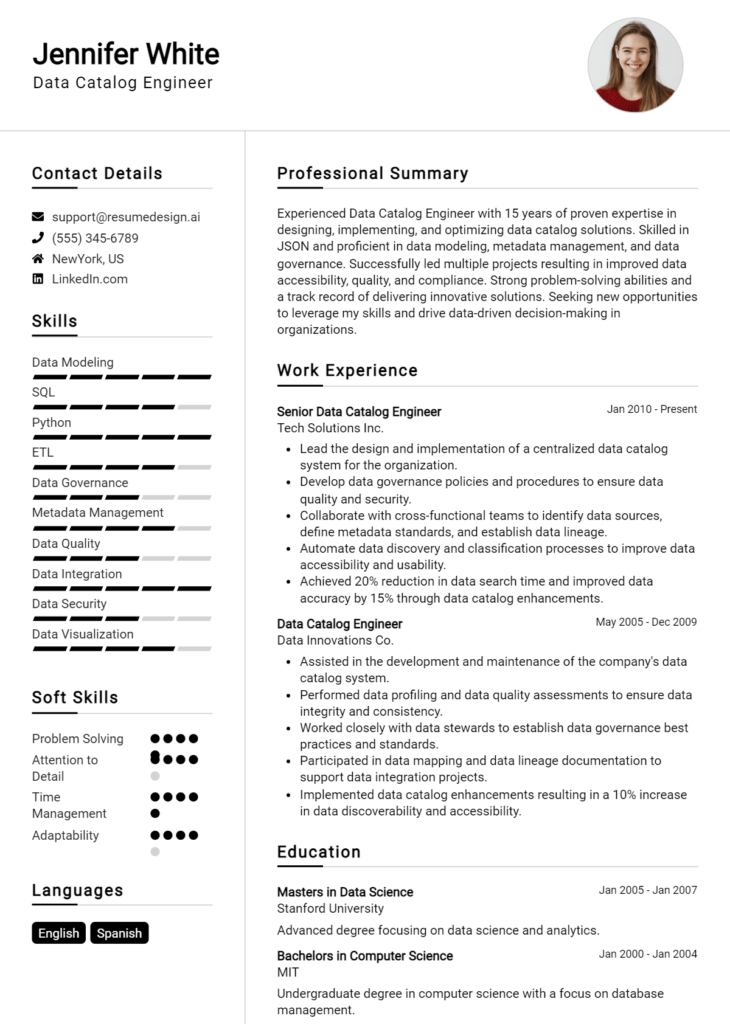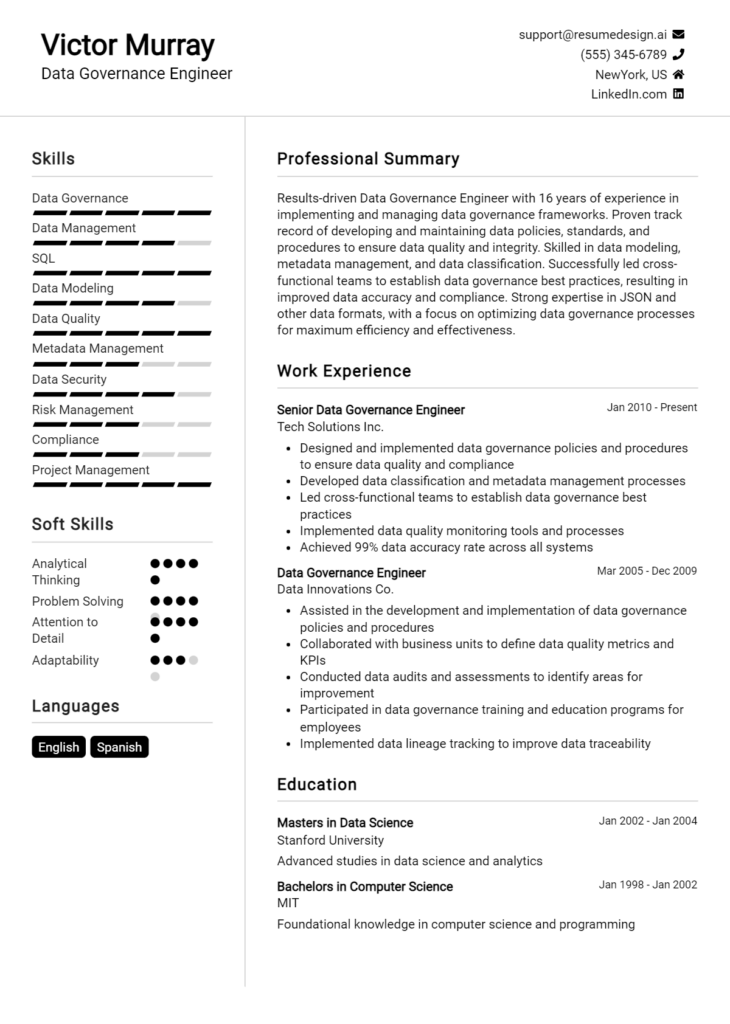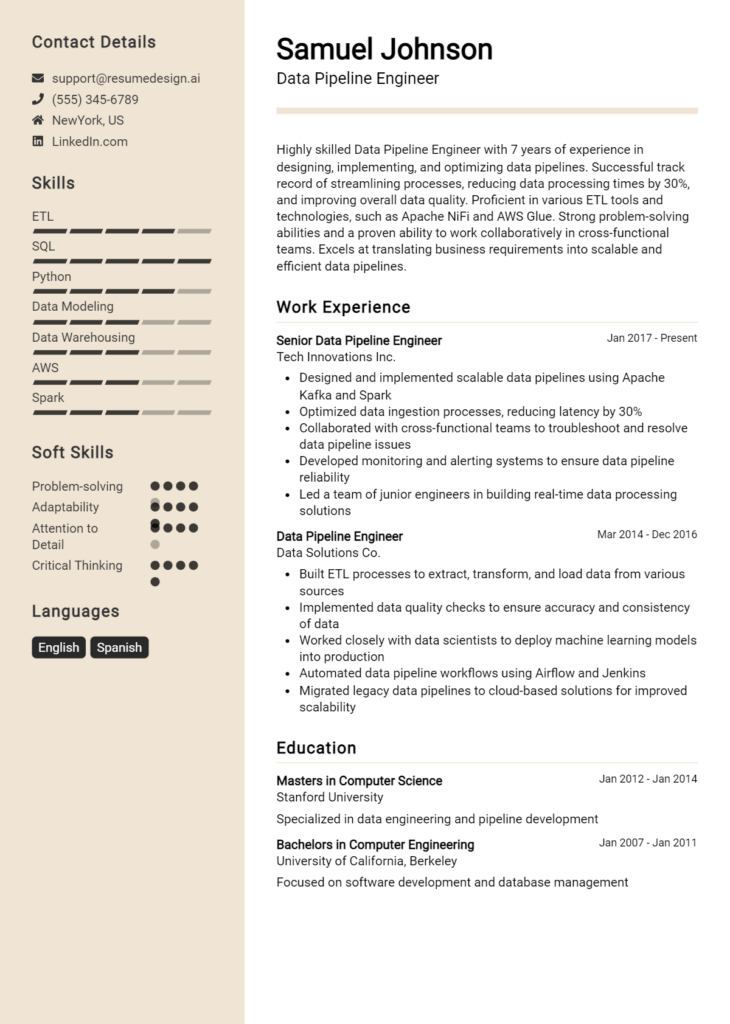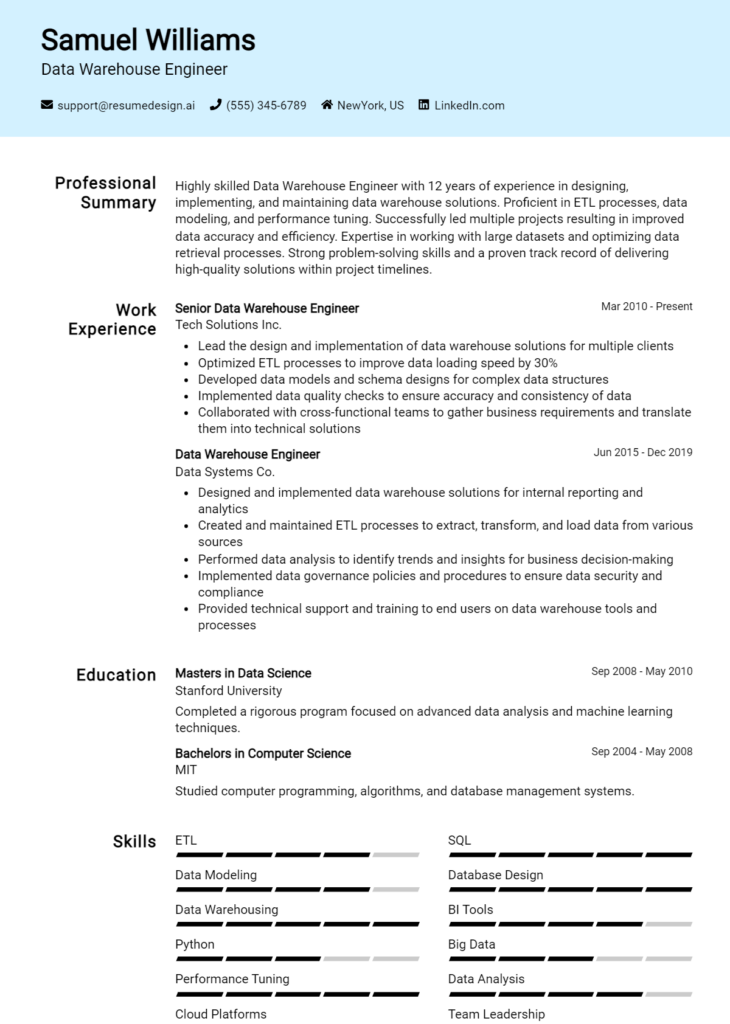Data Lake Engineer Core Responsibilities
A Data Lake Engineer plays a crucial role in managing and optimizing data storage solutions, ensuring seamless data flow across various departments. They must possess strong technical skills in big data technologies, cloud platforms, and data modeling, along with operational expertise in data governance and security. Problem-solving abilities are essential for troubleshooting and enhancing data processes. By effectively showcasing these qualifications in a well-structured resume, professionals can align their contributions with organizational goals, demonstrating their value in fostering data-driven decision-making.
Common Responsibilities Listed on Data Lake Engineer Resume
- Design and implement data lake architecture and infrastructure.
- Integrate diverse data sources into a unified data lake.
- Optimize data ingestion processes for efficiency and performance.
- Ensure data quality, consistency, and integrity across all datasets.
- Collaborate with data scientists and analysts to support data-driven initiatives.
- Monitor and troubleshoot data flows and processing jobs.
- Implement data governance and security policies.
- Develop and maintain documentation for data lake systems.
- Stay updated on industry trends and emerging technologies.
- Provide technical support to various stakeholders across departments.
- Conduct regular audits and assessments of data architecture.
- Facilitate training sessions for team members on data lake usage.
High-Level Resume Tips for Data Lake Engineer Professionals
In the competitive landscape of data engineering, a well-crafted resume is essential for Data Lake Engineer professionals. This document often serves as the first impression a candidate makes on potential employers, making it crucial for the resume to effectively reflect both skills and achievements. A standout resume not only highlights technical expertise but also showcases the unique contributions a candidate can bring to a team. This guide will provide practical and actionable resume tips specifically tailored for Data Lake Engineer professionals, ensuring that your application stands out in a crowded field.
Top Resume Tips for Data Lake Engineer Professionals
- Tailor your resume to the job description by incorporating relevant keywords and phrases that align with the specific requirements of the role.
- Showcase your experience with data lake technologies such as AWS Lake Formation, Apache Hadoop, or Azure Data Lake Storage.
- Quantify your achievements by using metrics and data to illustrate the impact of your work (e.g., "optimized data processing time by 30%").
- Highlight your proficiency in programming languages commonly used in data engineering, such as Python, Scala, or Java.
- Include any relevant certifications, such as AWS Certified Data Analytics or Google Cloud Professional Data Engineer, to enhance credibility.
- Demonstrate your understanding of data governance and security practices, which are critical in managing data lakes.
- Emphasize your experience with ETL processes and tools, showcasing your ability to move and transform data efficiently.
- List any collaborative projects or teamwork experiences, as data lake engineering often involves cross-functional collaboration.
- Keep your resume concise and focused, ideally within one to two pages, ensuring clarity and easy readability.
By implementing these tips, Data Lake Engineer professionals can significantly increase their chances of landing a job in this dynamic field. A well-optimized resume not only highlights your skills and achievements but also positions you as a strong candidate capable of contributing to the growth and efficiency of data-driven organizations.
Why Resume Headlines & Titles are Important for Data Lake Engineer
In the competitive landscape of data engineering, a Data Lake Engineer plays a crucial role in managing and optimizing large volumes of data. As the first impression a hiring manager gets from a resume, the headline or title holds significant importance. A strong headline can instantly capture attention and succinctly summarize a candidate's key qualifications in a compelling way. It should be concise, relevant, and directly related to the job being applied for, effectively setting the tone for the rest of the application and encouraging further exploration of the candidate's experience and skills.
Best Practices for Crafting Resume Headlines for Data Lake Engineer
- Keep it concise and to the point—aim for one impactful phrase.
- Use specific job titles that reflect the position being applied for.
- Incorporate relevant skills and technologies related to data lakes.
- Highlight years of experience or notable achievements when applicable.
- Avoid jargon or overly complex language; clarity is key.
- Make it action-oriented, emphasizing your role and contributions.
- Tailor the headline for each application to align with the job description.
- Use keywords from the job posting to increase visibility to applicant tracking systems.
Example Resume Headlines for Data Lake Engineer
Strong Resume Headlines
Innovative Data Lake Engineer with 5+ Years of Experience in Big Data Solutions
Expert Data Lake Architect Specializing in ETL Processes and Cloud Integrations
Data Lake Engineer Proficient in Apache Spark and AWS, Delivering Scalable Data Solutions
Weak Resume Headlines
Data Engineer Seeking Opportunities
Experienced Professional in Data Management
The strong headlines are effective because they are specific and tailored to the Data Lake Engineer role, showcasing relevant skills, experience, and expertise that immediately resonate with hiring managers. They provide a clear snapshot of the candidate’s qualifications, making a lasting impression. In contrast, the weak headlines lack specificity and fail to communicate the candidate's strengths or relevance to the job, making them forgettable and less likely to engage the reader's interest.
Writing an Exceptional Data Lake Engineer Resume Summary
A well-crafted resume summary is essential for a Data Lake Engineer as it serves as the first impression for hiring managers. In a competitive job market, a strong summary quickly captures attention by highlighting key skills, relevant experience, and notable accomplishments that align with the role. It should be concise, impactful, and tailored specifically to the job description, ensuring that it resonates with the requirements and expectations of potential employers. A compelling resume summary not only sets the tone for the rest of the resume but also establishes the candidate's suitability for the position right from the start.
Best Practices for Writing a Data Lake Engineer Resume Summary
- Quantify Achievements: Use specific numbers or percentages to demonstrate the impact of your work.
- Focus on Relevant Skills: Highlight technical skills that are directly applicable to data lake engineering, such as data modeling, ETL processes, or cloud technologies.
- Tailor the Summary: Customize the summary for each job application to reflect the specific requirements and responsibilities listed in the job description.
- Keep it Concise: Aim for 3-5 sentences that deliver maximum impact without unnecessary fluff.
- Use Industry Keywords: Incorporate keywords from the job listing to pass through Applicant Tracking Systems (ATS) and grab the attention of hiring managers.
- Showcase Problem-Solving Abilities: Highlight your experience in resolving complex data challenges or optimizing data architectures.
- Emphasize Collaboration: Mention experience working with cross-functional teams or stakeholders to convey your ability to contribute in a team environment.
- Demonstrate Continuous Learning: Indicate any relevant certifications or ongoing education that showcases your commitment to professional growth in the field.
Example Data Lake Engineer Resume Summaries
Strong Resume Summaries
Results-driven Data Lake Engineer with over 5 years of experience in designing and implementing scalable data storage solutions. Successfully migrated 10 TB of legacy data to an AWS-based data lake, improving data accessibility and reducing retrieval times by 30%.
Detail-oriented Data Lake Engineer skilled in building ETL pipelines and optimizing data workflows. Achieved a 25% reduction in processing time through the implementation of Apache Spark, while ensuring compliance with data governance standards.
Innovative Data Lake Engineer with expertise in big data technologies, including Hadoop and Snowflake. Played a key role in integrating real-time data feeds, resulting in a 40% increase in analytic capabilities for business intelligence teams.
Weak Resume Summaries
Experienced data engineer looking for opportunities in data management.
Data Lake Engineer with knowledge of various technologies interested in contributing to a team.
The strong resume summaries stand out because they are specific, quantify achievements, and directly relate to the skills and responsibilities of a Data Lake Engineer. They provide clear evidence of the candidate's impact in previous roles, making them compelling to hiring managers. In contrast, the weak summaries are vague and lack detail, failing to communicate the candidate's qualifications or the value they can offer, which diminishes their effectiveness in a competitive job market.
Work Experience Section for Data Lake Engineer Resume
The work experience section of a Data Lake Engineer resume is critical as it serves as a direct reflection of the candidate's technical expertise, leadership capabilities, and commitment to delivering high-quality data solutions. This section not only highlights the candidate's proficiency in managing complex data architectures and engineering teams but also demonstrates their ability to drive successful outcomes through quantifiable achievements. Aligning work experience with industry standards is essential, as it provides potential employers with clear evidence of the candidate's ability to contribute effectively to their organization.
Best Practices for Data Lake Engineer Work Experience
- Clearly articulate technical skills relevant to data lake engineering, such as ETL processes, data modeling, and cloud technologies.
- Quantify achievements with specific metrics, such as percentage improvements in data processing times or cost savings achieved.
- Highlight leadership roles, showcasing experience in managing teams or projects that led to successful data initiatives.
- Demonstrate collaboration skills by mentioning cross-functional projects or partnerships with other departments.
- Use industry-standard terminology to ensure alignment with employer expectations and trends.
- Include relevant technologies and tools utilized, such as Hadoop, Spark, AWS, or Azure Data Lake.
- Focus on outcomes rather than responsibilities; emphasize what was achieved as a result of your contributions.
- Tailor the work experience section to match the job description, ensuring relevance to the specific role being applied for.
Example Work Experiences for Data Lake Engineer
Strong Experiences
- Led a team of 5 engineers to design and implement a scalable data lake solution, resulting in a 30% reduction in data retrieval times for analytics.
- Developed ETL processes that integrated data from 10+ sources, increasing data accuracy by 25% and enabling real-time analytics.
- Collaborated with the data science team to create a machine learning pipeline, improving predictive model accuracy by 15% within 6 months.
- Managed a cross-departmental project to migrate legacy systems to AWS Data Lake, achieving a 40% cost reduction in data storage and processing.
Weak Experiences
- Worked on data projects that involved various technologies.
- Assisted in the development of data lakes.
- Participated in meetings about data storage solutions.
- Helped with data processing tasks for multiple projects.
The examples classified as strong experiences effectively demonstrate quantifiable outcomes, showcase technical leadership, and highlight successful collaboration with other teams. In contrast, the weak experiences lack specificity and measurable results, making it difficult for potential employers to assess the candidate's real contributions and skills. Strong experiences provide a clear narrative of the candidate's impact, while weak experiences fail to convey any substantial achievements or responsibilities.
Education and Certifications Section for Data Lake Engineer Resume
The education and certifications section in a Data Lake Engineer resume is crucial for showcasing a candidate's academic background and commitment to industry standards. This section not only reflects the foundational knowledge gained through formal education but also highlights relevant certifications that validate the candidate's expertise in data engineering and management. Continuous learning is vital in the rapidly evolving field of data technology, and listing specialized training and relevant coursework demonstrates a proactive approach to skill enhancement. By providing this information, candidates can significantly bolster their credibility and align themselves with the specific requirements of the job role.
Best Practices for Data Lake Engineer Education and Certifications
- Include degrees in computer science, data engineering, or related fields to establish a strong educational foundation.
- Highlight industry-recognized certifications, such as AWS Certified Data Analytics or Google Cloud Professional Data Engineer.
- List relevant coursework that pertains to data lakes, big data technologies, or data warehousing.
- Ensure that all certifications are current and reflect the latest technologies and methodologies.
- Present a clear timeline for education and certifications to show continuous professional development.
- Tailor the education and certifications section to match the job description, emphasizing the most relevant qualifications.
- Include any specialized training in tools commonly used in data lakes, like Apache Hadoop or Spark.
- Use clear formatting to make the information easily readable and accessible to recruiters.
Example Education and Certifications for Data Lake Engineer
Strong Examples
- Bachelor of Science in Computer Science, University of Technology, Graduated May 2021
- AWS Certified Data Analytics - Specialty, Obtained March 2023
- Coursework: Advanced Data Engineering, Big Data Technologies, and Data Warehousing Principles
- Google Cloud Professional Data Engineer Certification, Obtained January 2022
Weak Examples
- Associate Degree in Liberal Arts, Completed August 2019
- Certification in Basic Computer Skills, Obtained June 2020
- Coursework: Introduction to Psychology, History 101
- Old Certification: Microsoft Certified Professional (2010)
The examples provided highlight a stark contrast in relevance and alignment with the Data Lake Engineer role. Strong examples showcase degrees and certifications that are directly related to data engineering, indicating a solid foundation and commitment to the field. In contrast, weak examples reflect qualifications that are either outdated or unrelated to the core competencies required for the position, thus failing to establish the candidate's credibility in the data engineering domain.
Top Skills & Keywords for Data Lake Engineer Resume
As a Data Lake Engineer, possessing the right blend of skills is essential for optimizing data storage, management, and retrieval processes. A well-crafted resume that highlights both hard and soft skills can significantly enhance your chances of landing a job in this competitive field. Skills not only demonstrate your technical expertise but also showcase your ability to work collaboratively with teams and adapt to changing project requirements. For aspiring Data Lake Engineers, understanding which skills to emphasize on your resume is crucial to stand out to potential employers.
Top Hard & Soft Skills for Data Lake Engineer
Soft Skills
- Problem-solving
- Communication
- Team collaboration
- Adaptability
- Critical thinking
- Time management
- Attention to detail
- Creativity
- Conflict resolution
- Project management
Hard Skills
- Data modeling
- ETL (Extract, Transform, Load) processes
- SQL and NoSQL databases
- Cloud platforms (AWS, Azure, Google Cloud)
- Data warehousing
- Big data technologies (Hadoop, Spark)
- Data governance and security
- Programming languages (Python, Java, Scala)
- Data pipeline construction
- Performance tuning and optimization
By focusing on these skills, you can create a compelling resume that effectively showcases your qualifications. Additionally, ensure your work experience reflects relevant projects and achievements that demonstrate your proficiency in both soft and hard skills related to data engineering.
Stand Out with a Winning Data Lake Engineer Cover Letter
Dear [Hiring Manager's Name],
I am writing to express my enthusiasm for the Data Lake Engineer position at [Company Name], as advertised on [Job Board/Company Website]. With a robust background in data engineering and a deep understanding of data lake architecture, I am excited about the opportunity to contribute to your team. My experience in designing and implementing scalable data solutions aligns perfectly with your needs, and I am eager to leverage my skills to optimize data storage and enable advanced analytics.
In my previous role at [Previous Company Name], I successfully managed the migration of traditional data warehouses to a cloud-based data lake, resulting in a 30% reduction in data retrieval times and significant cost savings. I have hands-on experience with technologies such as Apache Hadoop, AWS S3, and Apache Spark, which I utilized to build ETL pipelines that transformed raw data into actionable insights. My ability to collaborate effectively with cross-functional teams, coupled with my expertise in data modeling and governance, ensures that I can deliver high-quality data solutions that meet both technical and business requirements.
I am particularly drawn to [Company Name] because of your commitment to innovation and the strategic use of data in driving business decisions. I am excited about the prospect of working in an environment that values creativity and forward-thinking approaches to data management. I am confident that my skills in data integration, performance optimization, and data quality assurance will make a meaningful impact on your projects.
Thank you for considering my application. I look forward to the opportunity to discuss how my background, skills, and enthusiasms align with the goals of your team. I am eager to contribute to the continued success of [Company Name] as a Data Lake Engineer and am excited about the potential to drive data-driven strategies that propel the organization forward.
Sincerely,
[Your Name]
[Your LinkedIn Profile or Contact Information]
Common Mistakes to Avoid in a Data Lake Engineer Resume
When crafting a resume for a Data Lake Engineer position, it's crucial to present your skills and experiences effectively. However, many candidates make common mistakes that can hinder their chances of landing an interview. Avoiding these pitfalls can significantly enhance the clarity and impact of your resume, ensuring that hiring managers recognize your qualifications. Here are some common mistakes to watch out for:
Vague Job Descriptions: Failing to provide specific details about your previous roles can leave hiring managers unsure of your actual experience. Always quantify your contributions and highlight relevant technologies used.
Ignoring Relevant Skills: Data Lake Engineers work with various tools and technologies. Not showcasing your proficiency in key areas like Hadoop, Spark, or cloud platforms can make your resume less appealing to employers.
Overloading with Technical Jargon: While it’s important to demonstrate your technical expertise, excessive jargon can alienate readers. Strive for a balance that conveys competence without overwhelming the reader.
Not Tailoring the Resume: Sending out a generic resume can dilute your chances of getting noticed. Customize your resume for each job application by aligning your skills and experiences with the job description.
Omitting Soft Skills: Technical skills are vital, but soft skills like teamwork, communication, and problem-solving are equally important. Highlighting these attributes can provide a more rounded view of your capabilities.
Neglecting to Show Impact: Simply listing responsibilities doesn't demonstrate your value. Use metrics and outcomes to show how your contributions positively impacted projects or organizations.
Inconsistent Formatting: A cluttered or inconsistent format can distract from your content. Ensure your resume is well-organized, with clear headings, bullet points, and consistent font styles for better readability.
Forgetting About Continuous Learning: The tech field is always evolving. Not mentioning any recent certifications, courses, or learning experiences can signal a lack of commitment to staying current in the field.
Conclusion
As a Data Lake Engineer, your role is pivotal in managing and optimizing the massive volumes of data that organizations collect. Throughout this article, we've explored the essential skills required for the position, including expertise in data architecture, proficiency in big data technologies, and a strong understanding of data governance and security. We also discussed the importance of collaboration with data scientists and analysts to ensure that the data lake serves its purpose effectively.
The demand for skilled Data Lake Engineers is on the rise, making it crucial to showcase your qualifications and experience effectively. A well-crafted resume is your key to standing out in this competitive field. Take a moment to review your current resume and ensure it highlights relevant skills, projects, and accomplishments that align with the expectations of potential employers.
To assist you in this process, consider utilizing the various resources available. Explore resume templates to find a layout that best represents your professional journey. You can also use the resume builder for an easy and efficient way to create a polished resume. Additionally, reviewing resume examples can provide inspiration and guidance on how to present your experience effectively. Don’t forget to enhance your application with well-structured cover letter templates that complement your resume.
Take the next step towards landing your dream job as a Data Lake Engineer—revise your resume today and leverage these tools to put your best foot forward!

